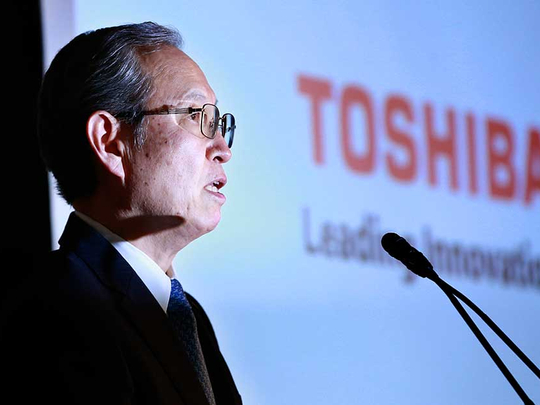
Tokyo: Toshiba on Tuesday warned its survival was at risk as the struggling Japanese industrial giant reported a loss of $4.8 billion in long-overdue financial results.
One of the country’s best-known firms, Toshiba had twice delayed its earnings and faced the possibility of an embarrassing delisting from the Tokyo stock exchange if it missed the Tuesday deadline for reporting.
The unaudited results showed the troubled firm lost 532.5 billion yen in April-December. It has previously forecast losses could balloon to more than a trillion yen in the fiscal year to March.
Japan’s financial regulators had given the firm more time to assess the impact of huge writedowns at its US nuclear unit Westinghouse Electric, which filed for bankruptcy protection last month.
“It’s likely that the company’s financial situation will turn severe” owing to problems at Westinghouse, it said in a Japanese-language statement released with the results.
“There are events and circumstances that may bring about significant questions about the idea of (carrying on) as a going concern,” it added.
The warning comes as media reports say Taiwanese giant Foxconn is offering to pay the cash-strapped firm up to 3.0 trillion yen for its prized memory chip business.
Toshiba has said it needed more time to probe claims of financial misconduct by senior managers at Westinghouse and gauge the impact on its finances.
The probe was started after a whistleblower complained that one or more executives at the US unit exerted “inappropriate pressure” on its accounting.
Toshiba’s auditor said Tuesday it would not sign off on the latest results until it had finished “evaluating” the firm’s probe, among other issues.
“This evaluation process was continuing at the time of the reporting,” it said in the statement.
“As a result, the auditing firm was unable to judge whether the... financial statement requires amendments or not.”
Earlier, Japanese media said the auditor suspects the alleged wrongdoing at Westinghouse had been going on for longer than previously thought, which could mean revising earlier financial statements.
- ‘Stock collapses’ -
======================
Toshiba shares have been hammered this year, losing more than half their value since late December when it first warned of multi-billion-dollar losses at Westinghouse.
They fell 2.69 percent to finish at 223.5 yen on Tuesday, before the results.
The earnings release may give Toshiba some breathing room, but its embattled stock could still be delisted depending on the results of its probe into the alleged wrongdoing.
The crisis comes less than two years after the firm’s reputation was badly damaged by separate revelations that top executives had pressured underlings to cover up weak results for years after the 2008 global financial meltdown.
The huge conglomerate - which has 188,000 employees globally - once touted its overseas nuclear business as a future growth driver, filling a hole left after the 2011 Fukushima crisis slammed the brakes on new atomic projects in Japan.
But delays and cost overruns have hit Westinghouse’s finances hard.
Toshiba has sold a number of assets, including a medical devices unit and most of its home appliance business.
Turkish electronics manufacturer Vestel said Monday it is in talks to buy Toshiba’s television unit.
South Korea’s Hynix and American chipmaker Broadcom are among the firms in the running for Toshiba’s flash memory business, along with Apple-supplier Foxconn, which bought Japanese electronics giant Sharp last year.
Selling the division, which accounts for about one-quarter of Toshiba’s 5.6 trillion yen in annual revenue, is seen as key for the company to turn itself around.
Toshiba is the world’s number-two chipmaker behind South Korean rival Samsung.
But any foreign buyer - particularly a Chinese suitor - would need to pass a Japanese government review, given concerns about security around systems already using Toshiba’s memory chips, which are widely used in data centres as well as smartphones and computers.
Japanese media have said the government was in talks with domestic firms about putting together a bid to keep the technology from going abroad.










